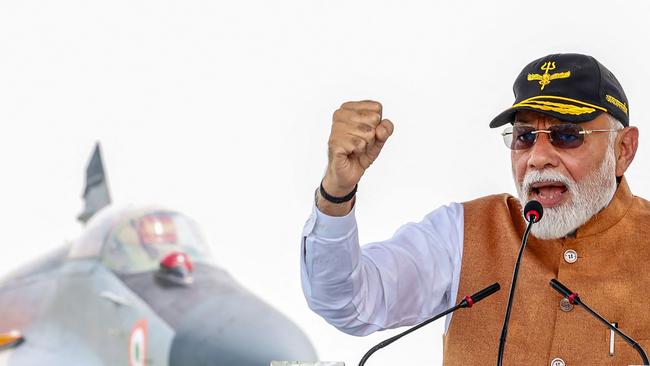‘New normal’ in India-Pakistan relations in age of terrorist strikes

During the four days of hostilities, India claimed to have hit more than a dozen air bases across Pakistan, destroyed several fighter aircraft and nearly one-fifth of the air force’s infrastructure, and killed many military personnel. Early in the fighting, Pakistan claimed to have downed five Indian aircraft. India declined comment but international reports indicated India had lost at least one French Rafale fighter to a Chengdu J-10C fighter armed with long-range Chinese PL-15 air-to-air missiles. This sent shockwaves through global defence circles as the first ever loss of a Rafale fighter in combat. As Rafale maker Dassault shares fell, the Chengdu corporation’s stock soared. The geopolitical implications of the real-world demonstration of the superiority of Chinese air combat capabilities over highly-regarded modern French fighter jets are huge.
Indian analysts criticised the ceasefire as yet another example of India snatching defeat from the jaws of victory. However John Spencer, a prominent West Point expert on modern combat warfare, strongly backs Indian claims of “a massive victory”. By now this is the more generally accepted version and the Chinese corporation’s stocks have fallen substantially back.
Air Marshal (ret’d) Raghunath Nambiar, in an unpublished, privately circulated paper, explained that the Indian Air Force’s “ability to project power, achieve air dominance and deliver precision strikes proved to be the linchpin of India’s response, compelling a swift cessation of hostilities on terms favourable to India” (quoted with permission).
The India-Pakistan conflict is starting to show striking similarities to the Israel-Palestine conflict. Pakistan sponsors, hosts, trains and arms jihadist groups that launch terrorist raids into India. India’s policy on how best to respond has morphed from reactive and diplomatic to military and proactive, throwing off the shackles of the nuclear overhang to emulate the core Israeli strategy of deterrence based in escalation dominance.
The Pakistani playbook had worked in the attack on India’s parliament on December 13,2001 and the 60-hour terrorist attack on Mumbai on November 26, 2008. Typically, as in the Middle East, the UN and world leaders counsel restraint and de-escalation of tensions and lavishly praised India’s strategic patience when their calls were heeded. But in every case Indians’ anger with and contempt for their own leaders grew exponentially producing a dangerous divide between the ruling class and the citizenry.
However, particularly after the killing of Osama bin Laden in Abbotabad in 2011 within a stone’s throw of its premier military academy, Pakistan lost plausible deniability of complicity in acts of terrorism in India. In February 2019, after suicide bombers struck a paramilitary convoy in Pulwama, Kashmir, killing 44 soldiers, PM Narendra Modi flipped the script. India conducted a “non-military pre-emptive action” against terrorist targets in Balakot. That is, not in Pakistan-administered Kashmir but in Pakistan proper. With its patience exhausted both with Pakistan and with the veto-ridden UN Security Council, India had moved to the policy of taking the fight into neighbouring territory from where terror attacks originate and eliminating the human leadership and material infrastructure of terrorism through targeted precision strikes.
India’s defence ministry statement on May 7 described the 24 initial strikes on nine different and geographically separated sites as “precise, focused, measured and non-escalatory”, aimed at terrorist infrastructure and not targeted at military facilities. The Indian army tweeted after the carefully calibrated strikes that “Justice is served” in retaliation for the Pahalgam massacre. The exchanges quickly escalated after Pakistan retaliated and military installations were then directly attacked and hit across Pakistan.
The strikes were dubbed “Operation Sindoor” using the Hindi word for the bright-red vermilion applied from the forehead along the hair parting by married women. This carries a deeply emotional resonance in traditional Hindu culture and society. It denoted justice for the victims and brought emotional closure for the Pahalgam widows.
In his address to the nation on May 13, Modi said “Operation Sindoor is now India’s new policy against terrorism”. Henceforth, India will respond to terrorist attacks on its own terms and not be constrained by Pakistan’s attempt at nuclear blackmail. Nor will India differentiate between the masterminds and government sponsors of terrorism.
Looking at the Indian military briefing on May 11 and Modi’s national address on May 13, the old normal of strategic restraint, infinite patience and international diplomatic costs and economic penalties has been displaced. Operation Sindoor was not about retaliation for Pahalgam but a redefinition of India’s strategic doctrine vis-à-vis terrorism from across the border in Pakistan.
And that is the most salient point of resemblance to Israel’s Gaza war. The ability and willingness to send advanced missiles and drones deep into Pakistan to degrade military assets and target terrorist infrastructure as the new normal, while controlling the escalation ladder, could mark Modi’s defining legacy in bilateral relations with the traditional enemy that has witnessed its first multi-domain warfare, including space and cyber assets.
Ramesh Thakur, a former United Nations assistant secretary-general, is emeritus professor in the Crawford School of Public Policy, Australian National University.



On April 16, Pakistan’s army chief General Asim Munir described Kashmir as his country’s “jugular vein, we will not forget it”. On April 22, terrorists killed 26 domestic tourists in Pahalgam, Kashmir, sparing Muslims. India blamed Pakistan but the latter rejected the charge, demanding evidence and impartial investigation. On May 7, India launched air strikes on alleged terror infrastructure in sites located across the border in Kashmir and Pakistan. Four days of intense and escalating aerial incursions, drone attacks and artillery shelling followed. On May 10, a ceasefire was announced by President Donald Trump, confirmed by both countries and seems to be holding.